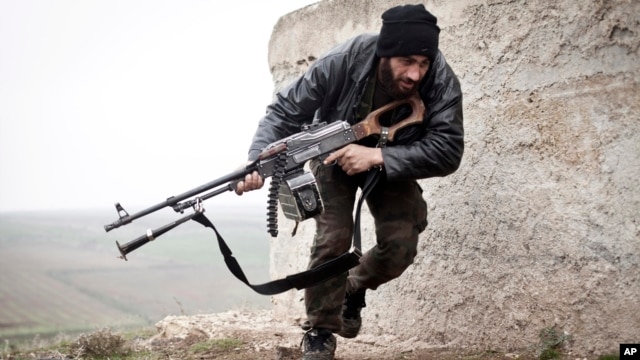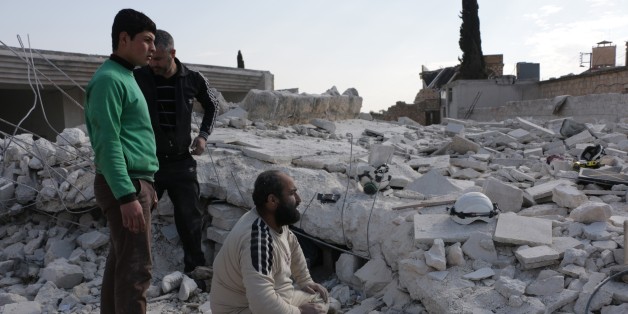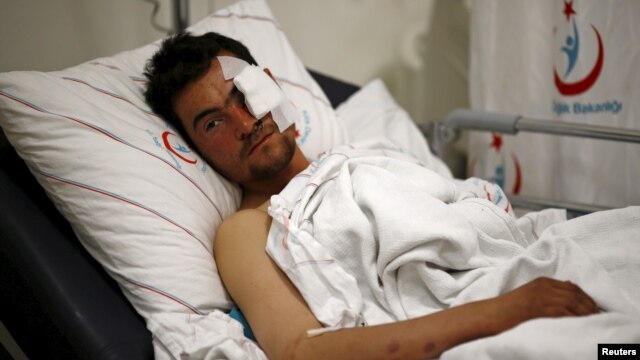
'With the partial cease-fire deal announced by the International Syria Support Group (ISSG) of 17 foreign powers, including Russia, in Munich not including a clear commitment from the Kremlin to end blistering Russian airstrikes immediately — a key demand of the Syrian opposition — the rebels dismiss the idea that Munich represents a breakthrough in the search for a political solution to end the brutal five-year-long civil war that has left upwards of 250,000 dead.
They view it instead as another way-station on a road that will lead to an inevitable Western-backed negotiated political deal that they won’t be able to accept.
“Fighters on the front-lines have some very harsh things to say about the West,” says Mohammed Adeeb, a senior figure in the 10,000-strong Shamiya Front, an alliance of secular and nationalist armed factions.
Speaking in Munich after lengthy talks, U.S. Secretary of State John Kerry said a U.N. task force would “work to develop the modalities for a long term and durable cessation of violence”. He acknowledged, though, that the deal was only so good as the paper it is written on and much further works is needed.
But some rebels and opposition politicians are drawing comparisons with another piece of paper signed in Munich in 1938.
Pro-opposition civil society activists also remain highly doubtful about the deal and what it may hold. “I will welcome the delivery of aid to all areas that need it,” says Bassam al-Kuwaiti, a well-known figure in opposition circles.
“As to the cease-fire, a political transition should start at the same time, or we will be allowing the Assad forces to capture lands under the banner of fighting the Islamic State or Jabhat al-Nusra, and therefore to obtain a powerful position that enables it to halt any political change,” he says.
But some rebels and opposition politicians are drawing comparisons with another piece of paper signed in Munich in 1938.
Pro-opposition civil society activists also remain highly doubtful about the deal and what it may hold. “I will welcome the delivery of aid to all areas that need it,” says Bassam al-Kuwaiti, a well-known figure in opposition circles.
“As to the cease-fire, a political transition should start at the same time, or we will be allowing the Assad forces to capture lands under the banner of fighting the Islamic State or Jabhat al-Nusra, and therefore to obtain a powerful position that enables it to halt any political change,” he says.
Some rebel commanders say they will have no choice but to back up al Nusra and Ahrar al-Sham, if a post-Munich regime offensive unfolds in Idlib — not just out of comradeship for other anti-Assad fighters but because a collapse by their forces there would weaken moderate and nationalist militias in Aleppo, too.
Gen. Salem Idris, the former chief of staff of the Western-backed Free Syrian Army, says of al Nusra and Ahrar al-Sham: “We don’t coordinate militarily on the battlefield with them but we do have a saying that any rifle trained on Assad deserves our support.” Rebel commanders say that regardless of what they decide to do in the event Idlib is targeted their own militiamen will want to fight there, weakening the coherence of moderate factions, if they resist the demands of their ranks.
Whatever the near future holds for the Syrian revolution against Assad, Nader Othman of the Syrian Interim Government insists the regime won’t win. “They might take more land and occupy it. There will be a resistance, it will revert to a guerrilla war, and Syrians can make things even harder for the Russians than they experienced in Afghanistan.”
He adds: “Our mistake was not to see our revolution as a national liberation struggle. This is no longer a civil war — we are occupied by many foreign forces and we should make that clear. This is now a war to eject foreign invaders.” '
Gen. Salem Idris, the former chief of staff of the Western-backed Free Syrian Army, says of al Nusra and Ahrar al-Sham: “We don’t coordinate militarily on the battlefield with them but we do have a saying that any rifle trained on Assad deserves our support.” Rebel commanders say that regardless of what they decide to do in the event Idlib is targeted their own militiamen will want to fight there, weakening the coherence of moderate factions, if they resist the demands of their ranks.
Whatever the near future holds for the Syrian revolution against Assad, Nader Othman of the Syrian Interim Government insists the regime won’t win. “They might take more land and occupy it. There will be a resistance, it will revert to a guerrilla war, and Syrians can make things even harder for the Russians than they experienced in Afghanistan.”
He adds: “Our mistake was not to see our revolution as a national liberation struggle. This is no longer a civil war — we are occupied by many foreign forces and we should make that clear. This is now a war to eject foreign invaders.” '









